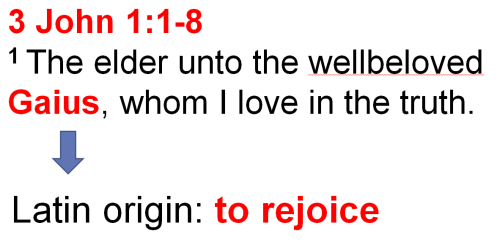3 John 1:1-8
1 The elder unto the wellbeloved Gaius, whom I love in the truth.
2 Beloved, I wish above all things that thou mayest prosper and be in health, even as thy soul prospereth.
3 For I rejoiced greatly, when the brethren came and testified of the truth that is in thee, even as thou walkest in the truth.
4 I have no greater joy than to hear that my children walk in truth.
5 Beloved, thou doest faithfully whatsoever thou doest to the brethren, and to strangers;
6 Which have borne witness of thy charity before the church: whom if thou bring forward on their journey after a godly sort, thou shalt do well:
7 Because that for his name’s sake they went forth, taking nothing of the Gentiles.
8 We therefore ought to receive such, that we might be fellowhelpers to the truth.
Love Promoted
John 21:15-17
15 So when they had dined, Jesus saith to Simon Peter, Simon, son of Jonas, lovest thou me more than these? He saith unto him, Yea, Lord; thou knowest that I love thee. He saith unto him, Feed my lambs.
16 He saith to him again the second time, Simon, son of Jonas, lovest thou me? He saith unto him, Yea, Lord; thou knowest that I love thee. He saith unto him, Feed my sheep.
17 He saith unto him the third time, Simon, son of Jonas, lovest thou me? Peter was grieved because he said unto him the third time, Lovest thou me? And he said unto him, Lord, thou knowest all things; thou knowest that I love thee. Jesus saith unto him, Feed my sheep.
If you examine this scenario closely, you’ll find that Peter indeed denied Jesus three times. It’s a profound moment in the biblical narrative, one that raises important questions about forgiveness and redemption. So, what did Jesus do in response to Peter’s denial? Surprisingly, He didn’t chastise him in the manner one might expect. Instead, Jesus demonstrated the power of forgiveness and grace by promoting Peter to the next level of responsibility within His ministry.
This event underscores a fundamental difference between the principles of the worldly system and those of the kingdom of God. In the worldly system, actions often yield reactions, and one’s mistakes can have lasting consequences. However, in the kingdom of God, the emphasis is on unconditional love and forgiveness. Jesus’s actions toward Peter serve as a profound example of this principle, reminding us that even in our moments of weakness and failure, there is an opportunity for growth, redemption, and a higher calling.
This narrative challenges us to reflect on our own lives and how we respond to the shortcomings of others. It encourages us to embrace forgiveness and compassion, recognizing that in the kingdom of God, love has the power to transform and elevate even the most imperfect among us.
Disguised Blessing
Genesis 27:19
19 And Jacob said unto his father, I am Esau thy first born; I have done according as thou badest me: arise, I pray thee, sit and eat of my venison, that thy soul may bless me.
Even in the story of Isaac, when Jacob deceived and lied to him, pretending to be Esau in order to receive his blessing, Isaac still bestowed his blessing upon him. At that time, Isaac was physically blind and unable to see the truth. This narrative reminds us that in the kingdom of God, we sometimes need to be spiritually “blind” to the superficial and worldly aspects of life in order to perceive the deeper and truer meaning of love.
In this context, being “blind” doesn’t mean being ignorant or oblivious but rather transcending the superficial appearances and judgments that often cloud our perception of others. It means looking beyond the surface and into the heart of a person, recognizing their worth and potential, even when they have flaws or have made mistakes.
Isaac’s act of blessing Jacob despite the deception teaches us that God’s love is not contingent upon perfection or flawless actions. In the kingdom of God, love is about grace, mercy, and recognizing the inherent value of each individual. It calls us to see beyond the masks and pretenses people may wear and to love them unconditionally, just as God loves us. This profound lesson challenges us to cultivate a deeper, more compassionate understanding of love within our own lives and interactions with others.
Unconditional Love (Agape)
-Prefix Un means NOT conditional
-Regardless
-Absolute
-No limitations
-Not required

First, it is important to learn how to find joy and contentment throughout our entire day-to-day life.
If you examine our past closely, as if through a microscope, you will realize that true prosperity encompasses not only material wealth but also the well-being of your health and soul. It requires finding joy in everything that surrounds you. Additionally, it’s essential to encourage your brethren to walk in truth and remain faithful in both giving and receiving.
Living a life filled with love should be your constant practice. Your partnership with God is indispensable in achieving this. This partnership involves reading His word of truth and growing together as a united family of believers.
In essence, prosperity in its deepest sense involves a holistic approach to life, encompassing physical, spiritual, and emotional well-being. It necessitates spreading love, supporting one another, and nurturing your relationship with God through the study of His truth. By doing so, you can find true abundance and fulfillment in every aspect of your life.
Included in whole-life prosperity:
1) Spiritual Prosperity
2) Emotional Prosperity
3) Mental Prosperity
4) Physical Prosperity
5) Relational Prosperity
6) Accomplishment Prosperity
7) Financial Prosperity
Secret to prosperity:
1) Seek the kingdom first and His righteousness
2) Loving God and Others
3) Faithful with everything
4) Joyful and Rejoicing
5) Grateful with Thanksgiving (you and others)
6) Meditate the word
7) Discovering the truth
8) Give honor
9) Watch what you say
10) Store to the storehouse
